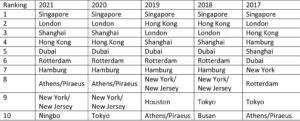
- Singapore tops the list for the eighth year followed by London, Shanghai, Hong Kong and Dubai
- Top 10 locations remain largely unchanged since 2020, despite the impact of COVID-19, and features four Asian, four European, one Middle East and one United States location
- Asia occupies three of the top five spots
Singapore has emerged as the top global shipping centre for the eighth year running based on the Xinhua-Baltic International Shipping Centre Development Index and global maritime data provider Baltic Exchange.
The index is an independent ranking of the performance of locations around the world that provide port and professional services to the shipping industry.
Singapore has been rated as the top location due to the size of its port, number of internationally-focused shipbrokers, financiers, lawyers and insurers based there and its supportive government policies.
Despite a significant drop in global trade and business disruptions in 2020 due to the pandemic, the relative positions of the world’s leading maritime centers have remained unchanged, according to a press release.
London, Shanghai, Hong Kong and Dubai were the next four strongest centers, as they were the prior year.

The rankings take in port factors including cargo throughput, number of cranes, length of container berths and port draught; number of players in maritime support businesses such as shipbroking, ship management, ship financing, insurance and law as well as hull underwriting premiums; and general business environment factors such as customs tariffs, extent of electronic government services and administration, ease of doing business and logistics performance.
Overall, 43 locations were rated with Singapore achieving a score of 97.2. The average score for a location was 58.8 points.
“This year’s rankings were made on the back of the global pandemic and major disruptions to lives and businesses around the world. Notwithstanding these challenges, the huge infrastructure of people and equipment that supports the global seaborne movement of billions of tonnes of trade held strong .We commend each and every maritime centre covered in the rankings as they have all played an integral role in facilitating these trade flows,” said Baltic Exchange Chief Executive Mark Jackson.
Xu Yuchang of China Economic Information Service, a subsidiary of Xinhua, said: “Affected by the COVID-19 pandemic, the international shipping industry has been undergoing significant changes since 2020. Facing such a big challenge, all practitioners in international shipping industry have done incredible jobs to maintain the global logistics stable and reliable and ensure epidemic prevention supplies. China Economic Information Services, in collaboration with the Baltic Exchange, has been working on the compilation and release of the Xinhua-Baltic International Shipping Centre Development Index ”for eight straight years. And now it has been highly recognized by global port and shipping institutions and become an acknowledged assessment tool for international shipping centers.”
Maritime and Port Authority of Singapore Chief Executive Quah Ley Hoon, said: “Singapore is honoured to once again top this prestigious index of global maritime locations. It is an effort of not one but an eco-system of many strong partners. The strong support from our port operators, industry partners, associations and unions has enabled Maritime Singapore to serve the needs of the sector and play its part to keep the global supply chain running amidst the COVID-19 pandemic. We will continue to work closely with our partners to provide a comprehensive suite of marine services, as well as a supportive business environment for shipping and maritime services. This includes supporting the industry on its immediate challenges facing seacrew, and its transformation along digitalisation, decarbonisation and capability development.”




